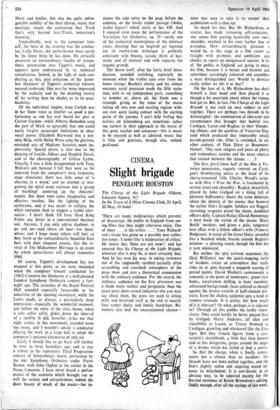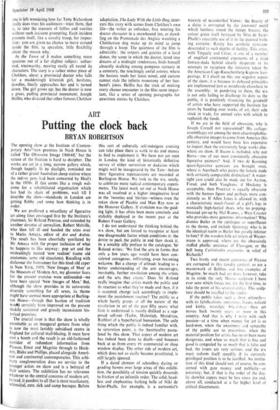CINEMA
Slight brigade
PENELOPE HOUSTON
In the Town of S (New Cinema Club, 24 April, 22 May, 19 June) 'There are many malpractices which prevent, or discourage, the public in England from see- ing films that they might otherwise enjoy. One of these . . . is the critics. . . .' Tony Richard- son's tirade has given us a possible new collec- tive noun: I rather like 'a malpractice of critics.' He insists that 'films are not news'; and has ensured that his Charge of the Light Brigade, whatever else it may be, is most certainly that. And he has won his way, in taking reviewers out of the supposedly rarefied (actually often scrambling and crowded) atmosphere of the press show and into a theoretical communion with the ordinary audience. For the record, the ordinary audience on the first afternoon was a shade more restless and peripatetic than the usual press show crowd (whateirer else you may say about them, the press are used to sitting still), and bestirred itself at the end to exactly four rather shaky and lonely handclaps. Re- viewers also had the unaccustomed chance- none was seen to take it—to temper their acidulation with a choc ice.
So much for that. But Mr Richardson, of course, has made reviewing self-conscious: one senses him peering hawkishly over one's shoulder, swathed in his own feather boa of prejudice. How extraordinarily pleasant it would be, at this stage in a film career so fraught with promises and ambitions and checks, to report an unequivocal success. A lot of 'the public in England' are going to enjoy his film, because it is heroic and historic and sometimes ravishingly coloured and assembles a most distinguished cast. Would its director really rather we left it at that?
On the face of it, Mr Richardson has dealt himself a slam hand and then played it as though a bit uncertain about where the trumps had got to. But, in fact, The Charge of the Light Brigade is not such an easy subject to pull together. There are perhaps two threads to be disentangled: the combination of character and circumstance that brought that baleful trio, Cardigan, Lucan and Raglan, to their blunder- ing climax; and the qualities of Victorian Eng- land which produced that impossibly steady parade-ground ride. (One is reminded, in an- other context, of Dick Diver at Beaumont- Hamel: 'This took religion and years of plenty and tremendous sureties and the exact relation that existed between the classes....')
The first, pre-Crimea half of the film is Vic- torian panoramic, vaguely centred on Cardi- gan's browbeating antics at the head of his cherry-trousered 11th. Charles Wood's script, as with How 1 Won the War, is fascinated by service ritual and absurdity : Raglan, beautifully played by John Gielgud on a dying fall of plaintive buffoonery, shares the same delusions about the identity of the enemy that haunted the earlier film's Grapple. Soldiers are flogged, recruiting sergeants prowl the slums, dandified officers dally. Captain Nolan (David Hemmings) is here made the victim of the insane 'Black Bottle' incident, and given a pale, tangential love affair with a fellow officer's wife (Vanessa Redgrave). A statue of the Great Duke, stranded like a beached whale, broods outside Raglan's window—a pleasing touch, though the film lets it turn whimsical.
But neither the spry cartoon sequences (by Dick-Williams), nor the quick-stepping rattle of incident, create an atmosphere that really sinks in, or goes beyond a snappish scoring of period points. David Watkin's camerawork is romantic to the point of tenderness: green river banks, cavalrymen drilling in hazy sunshine, unfocused backgrounds, faces isolated as though against the brown varnish of half-cleaned por- traits. Even the cholera epidemic gets a kind of camera. serenade. It is pretty, but how much of it is relevant? Or what, perhaps, is it relevant to? Through all this ambles the lordly trium- virate. They could hardly be better played than by Gielgud, Harry Andrews, all chin and irascibility as Lucan, or Trevor Howard as Cardigan, growling and whiskered like the Esso tiger. But they remain figures from a cari- caturist's sketchbook, a little less than human and so less dangerous, props around the edges of a drama which has failed to find a centre.
So that the charge, when it finally comes, seems less a climax than an incident: the threads have not been pulled together, and the film's slightly sullen and ungiving mood im- poses its detachment. It is anti-heroic in an obvious way, to be admired mainly for the flurried sternness of Kevin Brownlow's editing- Oddly enough, after all the sayings of last week, one is left wondering how far Tony Richardson really does trust his audiences—trust them, that is, to take the measure of follies and vanities without such insistent prompting. Each incident presents itself, like a cavalry troop, for inspec- tion: you are given no chance to move around inside the film, to speculate, little flexibility about the reason why.
In the Town of S makes something more spacious out of a far slighter subject: unhur- ried, trustworthy, moving easily all round its characters. The story is a rather minor piece of Chekhov, about a provincial doctor who falls for a maddeningly kittenish girl, hesitates, dawdles, finally approaches her and is turned down. The girl grows up; but the doctor is now a gross, pulling provincial monument. Joseph Heifits, who directed that other famous Chekhov
adaptation, The Lady With the Little Dog, inter- cuts this story with scenes from Chekhov's own life—the writer as onlooker, first meeting his doctor character in a snowbound inn, or dawd- ling on the Promenade des Anglais watching a Chekhovian dog make up its mind to jump through a hoop. The quietness of the film is admirable: the torpors and gaieties of a local dance, the scene in which the doctor, lured into dreams of a midnight rendezvous, finds himself absurdly skulking among pompous statuary in a cemetery, the touchingly awful soirees, where the hostess reads her latest novel, and custom cannot stale the infinite monotony of her hus- band's jokes. Heifits has the trick of making every chance encounter in the film seem impor- tant, like a series of opening paragraphs for unwritten stories by Chekhov.







































 Previous page
Previous page